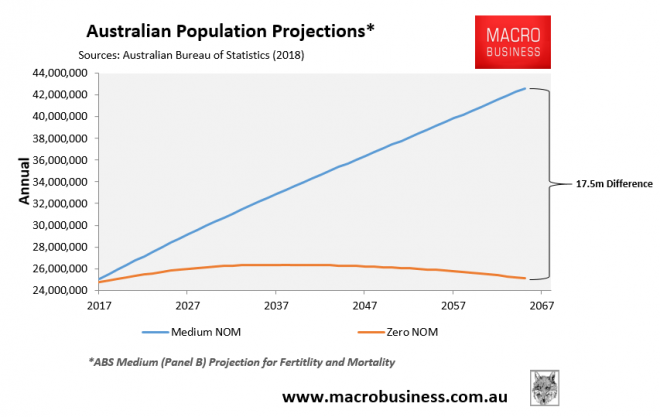It is fascinating watching our political masters play mental gymnastics and contort themselves over how to accommodate the extra 17.5 million people projected to arrive under the mass immigration ‘Big Australia’ policy:
Instead of addressing excessive population growth at the source by winding immigration back to historical levels:
Our policy makers throw up self-defeating schemes aimed at treating the symptoms under the guise of ‘better planning’ and ‘more infrastructure’, even though these plans have failed repeatedly in the past.
The latest hare-brained scheme comes from Population Minister Alan Tudge, who now sees Canada’s decentralised visa policy as the ‘holy grail’ that Australia should seek to emulate, alongside investment in high-speed rail:
The minister responsible for managing Australia’s population levels is looking to Canada for inspiration to shift more migrants to regional areas…
Before Canada changed its policy in the early 1990s, only 10 per cent of economic migrants settled outside the country’s major cities.
This figure has since risen to 34 per cent.
In Australia, just 14 per cent of the 1.4 million migrants who moved to Australia between 2011 and 2016 settled outside of greater capital cities.
Mr Tudge puts Canada’s program’s success down to offering migrants a strong welcome and support programs, a community network and help in finding work…
“Canada provides an interesting case study in how migration policy can achieve a better distribution of population growth,” he said…
Mr Tudge is also looking at how European countries like Germany and France have used fast rail to connect big capital cities to regional centres.
He suggested people could live in the regions and catch the train into big cities for work each day.
The federal government wants to connect most of the satellite cities of Melbourne, Sydney and Brisbane within 20 years…
While migration experts have welcomed the incentives, they warn that previous attempts to encourage migrants to settle in regional areas have failed in the long run as many people end up moving to the cities after the minimum regional stay.
Australia has tried decentralisation for 100 years and failed. So why does Tudge think that he can achieve success this time around?
Indeed, the ANU’s research of settlement patterns, released in April, showed that 60% of migrants that moved to Australia’s regions subsequently “fleed” to the cities within five years:
An Australian National University study released Thursday found more than 60 per cent of migrants move to a capital city after about five years of living in a regional or remote location.
ANU material went as far as saying new migrants were “fleeing” regional Australia for better opportunities in the cities.
Australia has a number of visas that are designed to entice migrants to regional areas but the research suggests more needs to be done to keep them there.
ANU demographer Bernard Baffour told SBS News, “you can move migrants to areas, but you can’t force them to stay there”…
The study found Chinese-born migrants are more likely to settle in Sydney. Erin Chew of the Asian Australian Alliance said, “a lot of the Chinese people are city dwellers, so they want to live in [places] where there’s a huge concentration of their community”…
Elsewhere, Melbourne is the city of choice for most Indian-born migrants.
Moreover, the comparison with Canada is daft given it has abundant water supplies, unlike Australia which is mostly desert.
Has Tudge not looked at Australia’s regions currently suffering drought and wondered: “how will these regions take on millions of extra people”?
Finally, the stupidity of Tudge is on full display with the following comment:
He suggested people could live in the regions and catch the train into big cities for work each day.
So, Tudge isn’t seeking to develop the regional economies, but rather turn these areas into dormitory commuter towns to feed the big cities, and at great cost.
Effectively, Tudge wants to spend many tens-of-billions of dollars building high-speed rail to replace cities’ ‘urban sprawl’ with even less efficient ‘leapfrog commuter sprawl’.
Again, rather than tackling the population monster directly by slashing immigration, Tudge has resorted, once again, to policy smokescreens. And incumbent residents will pay the price of this policy malfeasance via crushed amenity, more expensive user-pays infrastructure, smaller and more expensive housing, eroded wages, and a destroyed natural environment.
https://www.macrobusiness.com.au/2019/09/coalitions-canada-style-visa-system-doomed-to-fail/



